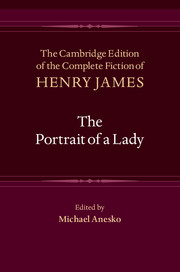Book contents
- Frontmatter
- Contents
- List of Illustrations
- Acknowledgments
- List of Abbreviations
- General Editors’ Preface
- General Chronology of James’s Life and Writings
- Introduction
- Textual Introduction
- Chronology of Composition and Production
- Bibliography
- The Portrait of a Lady
- Glossary of Foreign Words and Phrases
- Notes
- Textual Variants
- Emendations
- Appendices
Chapter 21
Published online by Cambridge University Press: 11 April 2021
- Frontmatter
- Contents
- List of Illustrations
- Acknowledgments
- List of Abbreviations
- General Editors’ Preface
- General Chronology of James’s Life and Writings
- Introduction
- Textual Introduction
- Chronology of Composition and Production
- Bibliography
- The Portrait of a Lady
- Glossary of Foreign Words and Phrases
- Notes
- Textual Variants
- Emendations
- Appendices
Summary
MRS. TOUCHETT, before arriving in Paris, had fixed a day for her departure; and by the middle of February she had begun to travel southward. She did not go directly to Florence, but interrupted her journey to pay a visit to her son, who at San Remo, on the Italian shore of the Mediterranean, had been spending a dull, bright winter, under a white umbrella. Isabel went with her aunt, as a matter of course, though Mrs. Touchett, with her usual homely logic, had laid before her a pair of alternatives.
“Now, of course, you are completely your own mistress,” she said. “Excuse me; I don't mean that you were not so before. But you are on a different footing—property erects a kind of barrier. You can do a great many things if you are rich, which would be severely criticised if you were poor. You can go and come, you can travel alone, you can have your own establishment: I mean of course if you will take a companion—some decayed gentlewoman with a darned cashmere and dyed hair, who paints on velvet. You don't think you would like that? Of course you can do as you please; I only want you to understand that you are at liberty. You might take Miss Stackpole as your dame de compagnie; she would keep people off very well. I think, however, that it is a great deal better you should remain with me, in spite of there being no obligation. It's better for several reasons, quite apart from your liking it. I shouldn't think you would like it, but I recommend you to make the sacrifice. Of course, whatever novelty there may have been at first in my society has quite passed away, and you see me as I am—a dull, obstinate, narrow-minded old woman.”
“I don't think you are at all dull,” Isabel had replied to this.
“But you do think I am obstinate and narrow-minded? I told you so!” said Mrs. Touchett, with much elation at being justified.
Isabel remained for the present with her aunt, because, in spite of eccentric impulses, she had a great regard for what was usually deemed decent, and a young gentlewoman without visible relations had always struck her as a flower without foliage.
- Type
- Chapter
- Information
- The Portrait of a Lady , pp. 211 - 216Publisher: Cambridge University PressPrint publication year: 2016

